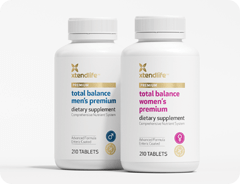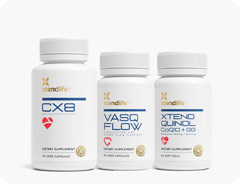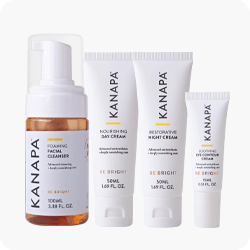By Dr. Joel Kahn, MD, FACC
When I talk to patients, memory issues and concern about brain health often come up early in the conversation. It's widely known that diet influences heart health, but what about brain health?
Memory gains and other mental strength are possible if you follow the "MIND diet," which has strong science but is not yet well-known. A key component of the MIND diet is getting adequate Omega-3 fatty acid-rich foods like “cold-water” fish. But what if you do not eat fish or are allergic? Let’s first learn about the MIND Diet.
The MIND diet is a combination of two highly ranked eating plans: the Mediterranean Diet and the DASH (Dietary Approach to Stop Hypertension Diet). Researchers at Rush University Medical Center developed the diet and tested it for memory and brain health in 2015, and it showed promise.
The initial study showed a reduction in the risk of Alzheimer’s Disease of 35% for those who followed it moderately and 53% for those who followed it closely. There are now several hundreds of science articles supporting it for a variety of neurologic diseases including multiple sclerosis.
Here are ten foods that are emphasized in the MIND Diet:
- Green, leafy vegetables: Aim for six or more servings per week like a big green salad with every dinner. Or go for more and shoot for 2 meals a day with greens.
- All other vegetables: Try to also eat another vegetable at least once a day. Broccoli, peppers and beans have a lot of nutrients with a low number of calories.
- Berries: Eat berries at least twice a week, particularly strawberries, blueberries, raspberries and blackberries for antioxidant benefits.
- Nuts: Five servings of nuts or more each week is the goal. It is probably best to vary the type of nuts you eat to obtain a variety of nutrients, but be sure to include walnuts for omega-3 content and Brazil nuts for selenium.
- Olive oil: Use olive oil as your main cooking oil. Avoid butter, lard and ghee (clarified butter).
- Whole grains: Aim for at least three servings daily. Choose whole grains like oatmeal, quinoa, brown rice, whole-wheat pasta and 100% whole-wheat bread. If you have Celiac disease, pick gluten-free grains.
- Fish: I choose to skip fish but if you are OK with them, eat fish at least once a week. It is best to choose fatty fish like salmon, sardines, trout, and mackerel for their high amounts of omega-3 fatty acids. Avoid too much tuna because of the risk of mercury toxins.
- Legumes: Include beans in at least four meals every week. This includes all beans, lentils, peas and soybeans. Firm organic tofu is good option.
- Poultry: Unless you are vegetarian or vegan, eat chicken or turkey at least twice a week in place of red meat. Do not eat fried chicken.
- Wine: Aim for no more than one glass daily. Both red and white wine may benefit the brain. If you prefer, no alcohol at all is fine.
There are five food categories to avoid on the MIND Diet:
- Butter and margarine
- Cheese
- Red meat
- Fried food
- Pastries and sweets
While it was designed for brain health, the MIND Diet also will benefit your blood pressure, blood sugar, weight and heart risk.
And going back to the question, what if you do not eat fish and still want to enjoy the brain and heart benefits of Omega-3 fatty acids? Or what if you do not like “cold water” fish richer in Omega-3 like salmon? I do not eat fish and have not for over 40 years. I supplement my diet with a high-quality Vegan Omega-3 made from algae by Xtendlife. When I check blood levels of Omega-3, I am very pleased that I am reaching safety levels of this important nutrient on par with my patients that choose to eat fish on a regular schedule. Furthermore, the confidence I have in the purity of the Vegan Omega-3 by Xtendlife is of key importance. For those that prefer Omega-3 supplements sourced from fish, I find the Omega 3/QH Premium CoQ10 by Xtendlife to be a superior product combining effective doses of DHA and EPA Omega-3 with a premium version of CoQ10 supporting both heart and brain health.


 Supplements
Supplements Bundles
Bundles



